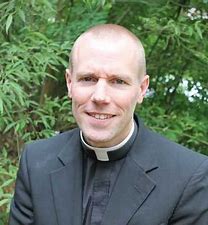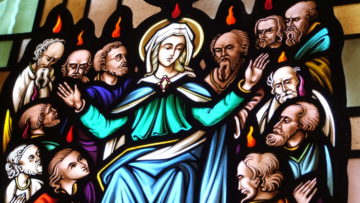Franciscan Sisters of Christian Charity share Fr. Nathan Reesman’s In Exile blog reflection for the Solemn Feast of Pentecost entitled ‘Of Pride and Pentecost’. Fr. Nathan Reesman is a priest of the Archdiocese of Milwaukee, ordained in 2006. He is the Shared Pastor of Immaculate Conception Parish and also of Saint Frances Cabrini Parish, both in West Bend, Wisconsin. Fr. Reesman is a graduate of the University of Wisconsin Madison, obtaining his  Bachelors of Arts in Political Science in the year 2000. Fr. Reesman completed his seminary studies at Saint Francis de Sales Seminary for the Archdiocese of Milwaukee in 2006, obtaining a Masters of Divinity. Father completed post-graduate studies at the University of Saint Mary of the Lake, Mundelein, obtaining a Doctor of Ministry in 2019.
Bachelors of Arts in Political Science in the year 2000. Fr. Reesman completed his seminary studies at Saint Francis de Sales Seminary for the Archdiocese of Milwaukee in 2006, obtaining a Masters of Divinity. Father completed post-graduate studies at the University of Saint Mary of the Lake, Mundelein, obtaining a Doctor of Ministry in 2019.
The stained glass window featured here in this blog post is from Saint Anne Parish, Escanaba, Michigan in the Diocese of Marquette.
The long Easter Season comes to a close as we celebrate on June 5th the Solemn Feast of Pentecost. As is the case with so many of our liturgical feasts, Pentecost is a celebration with layers and layers of history and meaning. One strong theological thread running through its celebration is the Church’s joy at the reversal of the tragedy of the Tower of Babel that is accomplished at Pentecost. These two Biblical events are directly related to each other, and as one understands the connection, one marvels at the power of God exercised on behalf of humanity, grasping more deeply the implication of the outpouring of the Holy Spirit.
The story of the construction of a great tower reaching to the heavens is part of what is often called “pre-history” by Scripture scholars. It is the final story of the early portion of the Book of Genesis that deals with events at the earliest days of the human family that are shrouded in symbolism and mystery. God reacts to the prideful attempt of humanity to construct a pathway of salvation without any divine help by introducing “babel” into the human family so that we would henceforth always be divided by language barriers. From then on, the pathway to authentic unity in the human family would be outside of the abilities of man to construct on his own. Only God’s direct intervention with his presence and grace would be able to foster a new type of unity for humanity. This unity originates in the truth of divine revelation that binds all nations and cultures together as believers from every time and tongue assent to its meaning.
It is the Holy Spirit fully unleashed in the human family on Pentecost that brings the unity that humanity craves. On the day of Pentecost the multitude of the nations gathered in Jerusalem heard the truth spoken by the Apostles each in their own language. In the Church, where the divine truths are preached and handed on, all cultures and races find their common bond and their unity even to this present day. The shattering that took place at Babel is now mended, at least to the extent that humanity chooses to adhere to the specific contours of the Gospel message. To adhere to the truth of revelation in the grace of the Holy Spirit requires a rejection of the pride of Babel, and an embrace of the humble posture of the Blessed Mother whose presence in the Upper Room at Pentecost ensures that God’s coming Spirit will find a truly receptive heart.
 This dynamic tension between the pride of Babel and the sweet humility of Pentecost that fosters authentic human community continues all the way to the present day, and it plays itself out anew in every generation. For example, among the gravest threats to the authentic unity of the human family facing us today is the fragmentation created by group identity politics in the West. We are hyper-obsessed with categories, terms, races, and “groups.” The Month of June has been hijacked now in the woke, pseudo-religion of American culture as the month of “pride,” which reinforces all of original themes of Babel. The cultural lexicon surrounding “pride month” relies upon the distortion of language, and it offers a false promise of unity under the mislabeled headings of “tolerance” and “diversity,” which in actual practice are not about authentic tolerance, and cannot deliver authentic diversity that by definition requires a common truth. A focus on identity that relies upon group categorization only leads to further division, and to the multiplication of more and more groups. It relies upon a rejection of the divine revelation that illuminates authentic human nature. It seeks to construct a new version of the human family that does not need God and even overtly rejects Him. The group identity politics that underlie pride month do not offer a future of harmony for the human family, but instead the opposite. Pride only brings division.
This dynamic tension between the pride of Babel and the sweet humility of Pentecost that fosters authentic human community continues all the way to the present day, and it plays itself out anew in every generation. For example, among the gravest threats to the authentic unity of the human family facing us today is the fragmentation created by group identity politics in the West. We are hyper-obsessed with categories, terms, races, and “groups.” The Month of June has been hijacked now in the woke, pseudo-religion of American culture as the month of “pride,” which reinforces all of original themes of Babel. The cultural lexicon surrounding “pride month” relies upon the distortion of language, and it offers a false promise of unity under the mislabeled headings of “tolerance” and “diversity,” which in actual practice are not about authentic tolerance, and cannot deliver authentic diversity that by definition requires a common truth. A focus on identity that relies upon group categorization only leads to further division, and to the multiplication of more and more groups. It relies upon a rejection of the divine revelation that illuminates authentic human nature. It seeks to construct a new version of the human family that does not need God and even overtly rejects Him. The group identity politics that underlie pride month do not offer a future of harmony for the human family, but instead the opposite. Pride only brings division.
The remedy to it all is of course Pentecost and the healing power of the Holy Spirit. However, this Spirit of Truth must be accepted with humble hearts that are willing to acknowledge its full depth and breadth. The Spirit will not come where he is not welcome, and he cannot fill hearts that are full of pride. Therefore, on Pentecost the entire Church proclaims anew “Come, Holy Spirit!” To voice this invitation is to open one’s heart, to reject pride, to reject the illusion of a cultural construction of Babel, and to assent to the truth of Divine Revelation about God’s plan for humanity. As we pursue this disposition of humility, the Holy Spirit will lead us in the authentic pathway of the unity of the human family. We cannot create it on our own, and by God’s grace and generosity, we do not have to. That is the power and the invitation of Pentecost.
Follow In Exile Blog.


